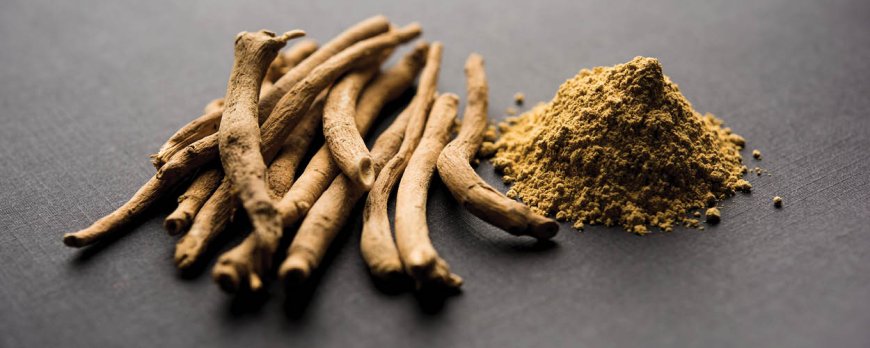Does ashwagandha have hormonal effects?
Uncover the truth: Does ashwagandha have hormonal effects? Dive into our comprehensive analysis exploring ashwagandha's impact on hormones.

Does ashwagandha have hormonal effects?
Ashwagandha is believed to have an influence on hormones and the endocrine system, but how exactly does it affect hormonal balance?
Key Takeaways:
- Ashwagandha has been found to have hormonal effects, particularly on DHEA-S and testosterone levels.
- In a study, ashwagandha supplementation led to increased DHEA-S and testosterone levels in overweight men aged 40-70 with mild fatigue.
- There were no significant differences in cortisol and estradiol levels between the ashwagandha group and the placebo group.
- Ashwagandha has been shown to improve sexual function and satisfaction in women.
- Ashwagandha is considered an adaptogen and has a range of health benefits, including stress and anxiety reduction.
- Further research with larger sample sizes is needed to confirm these findings.

The Effects of Ashwagandha on DHEA-S and Testosterone Levels
Studies have shown that ashwagandha supplementation may lead to increased levels of DHEA-S and testosterone, which are crucial hormones for various physiological functions. In a study conducted with overweight men aged 40-70 who experienced mild fatigue, participants who took ashwagandha extract saw significant improvements in DHEA-S and testosterone levels compared to those who received a placebo.
These findings highlight the potential benefits of ashwagandha for hormone balance. DHEA-S is a precursor hormone that plays a role in the production of other hormones, while testosterone is essential for reproductive health and overall well-being. By increasing the levels of these hormones, ashwagandha may contribute to improved energy levels, mood, and even sexual function.
Improving Hormonal Health with Ashwagandha
Ashwagandha has gained recognition for its adaptogenic properties, meaning it helps the body adapt to stress and maintain equilibrium. This adaptogenic nature extends to hormonal health, as ashwagandha has been found to regulate hormone levels and support overall balance. By modulating hormone production and activity, ashwagandha may enhance overall well-being and contribute to optimal hormonal health.
It's worth noting that while ashwagandha has shown promising effects on DHEA-S and testosterone levels, further research is needed to validate these findings and establish the mechanisms by which ashwagandha exerts its hormonal effects. Large-scale studies with diverse populations would provide a more comprehensive understanding of ashwagandha's impact on hormone balance and overall health.

Ashwagandha's Impact on Cortisol and Estradiol Levels
While ashwagandha has been found to impact DHEA-S and testosterone levels, its effects on cortisol and estradiol levels are not as well-established. Research on the relationship between ashwagandha and cortisol, the primary stress hormone, has yielded mixed results. Some studies suggest that ashwagandha may reduce cortisol levels, thereby potentially mitigating the harmful effects of chronic stress. However, other studies have not found significant changes in cortisol levels following ashwagandha supplementation.
Estradiol, a form of estrogen, plays a crucial role in various aspects of reproductive health, including menstrual cycles, fertility, and bone health. Currently, there is limited evidence to support a direct impact of ashwagandha on estradiol levels. Further studies are needed to determine if ashwagandha has any significant effects on estrogen production or metabolism.
Despite the lack of conclusive evidence regarding cortisol and estradiol levels, ashwagandha has shown promise in improving overall hormonal balance and reducing symptoms related to stress and reproductive health issues. It is important to note that individual responses to ashwagandha supplementation may vary, and consulting with a healthcare professional is advised before starting any new supplementation regimen.
Key Points:
- Ashwagandha's effects on cortisol levels are inconclusive, with some studies suggesting a potential reduction in cortisol, while others show no significant changes.
- Research on ashwagandha's impact on estradiol levels is limited, and further studies are needed to determine if there is a direct effect.
- Ashwagandha has shown promise in promoting hormonal balance and addressing symptoms related to stress and reproductive health, but individual responses may vary.
Ashwagandha's Effects on Sexual Function and Satisfaction
Some studies suggest that ashwagandha may improve sexual function and satisfaction in women, but more research is needed to determine its exact mechanisms and effectiveness. One study conducted on women with sexual dysfunction found that ashwagandha extract significantly improved various aspects of sexual health, including arousal, lubrication, orgasm, and overall satisfaction. These findings indicate the potential of ashwagandha as a natural remedy for enhancing sexual well-being in women.
Ashwagandha's effects on sexual function may be attributed to its ability to reduce stress and anxiety. Chronic stress and anxiety can negatively impact sexual desire and performance, and ashwagandha has been shown to have anxiolytic properties, reducing anxiety levels and promoting a sense of calmness. By alleviating stress and anxiety, ashwagandha may indirectly contribute to improved sexual function and satisfaction.
Furthermore, ashwagandha may also have positive effects on thyroid function, which plays a crucial role in regulating sexual hormones. The thyroid gland produces hormones that are essential for maintaining a healthy libido and sexual function. Limited research suggests that ashwagandha may help support the thyroid gland and optimize its function, potentially benefiting sexual health indirectly.
While early studies indicate the potential of ashwagandha in improving sexual function and satisfaction in women, it is important to note that more extensive research is necessary to fully understand its mechanisms of action and determine the effectiveness of ashwagandha as a treatment for sexual dysfunction. Additionally, factors such as dosage, duration of use, and individual variations need to be further explored to establish clear guidelines for its use in improving sexual well-being.
Ashwagandha as an Adaptogen and its General Health Benefits
Ashwagandha is classified as an adaptogen, a type of herb known for its ability to help the body adapt to stress and promote overall wellbeing. It has been used for centuries in Ayurvedic medicine to support the body's natural response to physical, mental, and emotional stressors.
One of the key benefits of ashwagandha is its potential to reduce stress and anxiety. Research suggests that ashwagandha may help lower cortisol levels, a hormone that is released during times of stress. By modulating cortisol levels, ashwagandha may help promote a sense of calm and relaxation.
Ashwagandha and Stress Reduction
- Reduces cortisol levels
- Promotes relaxation and calmness
- Aids in managing stress
- Supports overall mental well-being
In addition to its stress-reducing properties, ashwagandha has also been studied for its potential benefits in supporting overall mental well-being. Some research suggests that ashwagandha may help improve cognitive function, memory, and attention span.
Furthermore, ashwagandha may have a positive impact on physical health. It is believed to have antioxidant properties, which can help protect the body against cellular damage caused by free radicals. Some studies have also shown that ashwagandha may support immune system function and promote healthy energy levels.
Ashwagandha and Anxiety Reduction
- Promotes a sense of calm
- Reduces symptoms of anxiety
- Supports overall emotional well-being
- May improve sleep quality
While ashwagandha shows promise in promoting stress reduction and anxiety relief, it is important to note that further research is needed to fully understand its mechanisms of action and long-term effects. As with any supplement or herb, it is recommended to consult with a healthcare professional before incorporating ashwagandha into your routine.
In conclusion, ashwagandha is considered an adaptogen with potential benefits for stress reduction, anxiety relief, and overall health and well-being. Its centuries-old use in traditional medicine, combined with emerging scientific research, suggests that ashwagandha may be a valuable tool in promoting a balanced and healthy lifestyle.

The Need for Further Research
While initial research shows promising results, more comprehensive studies are necessary to confirm the specific hormonal effects of ashwagandha. Current studies have primarily focused on DHEA-S and testosterone levels, with mixed findings regarding cortisol and estradiol levels. To establish a clearer understanding of ashwagandha's impact on these hormones, further research needs to be conducted.
Specifically, larger sample sizes are needed to ensure accurate representation of diverse populations. Additionally, studies with longer durations can provide insight into the long-term effects of ashwagandha supplementation on hormonal balance. This would help determine whether ashwagandha is a viable option for individuals seeking natural alternatives to hormonal treatments.
Areas for future exploration may include:
- Examining the effects of ashwagandha on other hormones involved in the endocrine system, such as thyroid hormones and insulin.
- Investigating the mechanisms through which ashwagandha exerts its hormonal effects, including modulation of hormone receptors and signaling pathways.
- Assessing the impact of ashwagandha on specific subpopulations, such as individuals with hormonal imbalances or those undergoing hormone replacement therapy.
By addressing these areas, researchers can build a more comprehensive body of evidence regarding ashwagandha's hormonal effects. This knowledge will not only benefit individuals seeking hormonal balance but also contribute to the field of natural medicine and provide a holistic understanding of ashwagandha's potential benefits.
Conclusion
Ashwagandha shows potential for influencing certain hormones, such as DHEA-S and testosterone, but more research is needed to fully understand its impact on hormonal balance.
In a study conducted on overweight men aged 40-70 with mild fatigue, supplementation with ashwagandha extract resulted in increased levels of DHEA-S and testosterone compared to a placebo. However, there were no significant differences observed in cortisol and estradiol levels.
Furthermore, ashwagandha has been found to improve sexual function and satisfaction in women, while also having stress-reducing and anxiety-reducing effects. As an adaptogen, it offers a range of health benefits beyond its potential hormonal effects.
Despite these promising findings, it is crucial to note that further research with larger sample sizes is necessary to validate and expand upon the existing evidence. More studies are needed to gain a comprehensive understanding of ashwagandha's impact on hormonal balance and its potential therapeutic applications.

































































































































